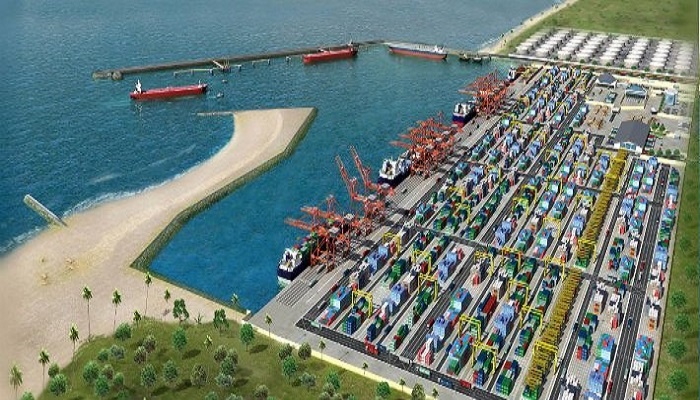Paragraph 1: The Rise of Lekki Deep Seaport as a Major Maritime Hub
The Lekki Deep Seaport, located in Lagos, Nigeria, has emerged as a significant player in the West African maritime landscape. From its inception, the port has experienced a remarkable surge in cargo handling, solidifying its position as a critical gateway for international trade. Its strategic location and modern infrastructure have attracted increasing vessel traffic and transshipment activities, contributing to the port’s rapid growth. The first half of 2025 witnessed the handling of 287,000 twenty-foot equivalent units (TEUs) of containers, a testament to the port’s expanding operations. This figure represents a substantial portion of the projected 500,000 TEUs for the entire year, indicating the port’s potential to exceed its initial targets.
Paragraph 2: Cargo Growth Trajectory and Transshipment Expansion
Lekki Deep Seaport’s impressive performance is underscored by a consistent year-on-year increase in cargo volume. The figures reflect a remarkable growth story, with 58,000 TEUs handled in 2023, followed by a substantial leap to 287,000,000 TEUs in 2024. While the 2024 figure appears exceptionally high and may be a typographical error, the overall trend points to significant growth. The port’s strategic focus on transshipment has further bolstered its operations. Transshipment involves transferring cargo from one vessel to another for onward transportation to its final destination. Lekki Deep Seaport has effectively leveraged its location and capabilities to become a transshipment hub for neighboring countries like Togo and Ghana. Plans are underway to extend these services to Onne Port in Nigeria and other West African nations, further enhancing regional connectivity.
Paragraph 3: Vessel Traffic and International Transshipment Operations
The port’s growing prominence is reflected in the steady increase in vessel calls. Currently, Lekki Deep Seaport receives between 10 and 12 vessels per month, a number expected to rise as the port expands its capacity and service offerings. The port’s management has emphasized its commitment to international transshipment as a key driver of growth. This strategy involves attracting cargo destined for other countries, using Lekki as a transit point. This approach not only boosts the port’s throughput but also contributes to its position as a regional logistics hub. The gradual recovery of the Nigerian Naira is seen as a positive factor in attracting more international transshipment business.
Paragraph 4: Commitment to World-Class Standards and Technological Advancement
Lekki Deep Seaport’s management has continually emphasized its dedication to maintaining international standards and leveraging technology to enhance operational efficiency. The port’s deepwater infrastructure allows it to accommodate larger vessels, contributing to economies of scale and improved connectivity. The port’s operators are committed to investing in cutting-edge technology and equipment to streamline processes, optimize cargo handling, and ensure seamless operations. This focus on technological advancement positions the port as a leader in the region’s maritime sector.
Paragraph 5: Impact on Regional Trade and Economic Development
Lekki Deep Seaport’s growing influence is having a significant impact on regional trade and economic development. By providing a modern and efficient gateway for international trade, the port facilitates the movement of goods, promoting economic growth and creating employment opportunities. Its strategic location within West Africa allows it to serve as a vital link in the global supply chain, connecting businesses in the region to international markets. The port’s contribution to regional economic integration is substantial, fostering trade partnerships and enhancing connectivity between landlocked countries and coastal hubs.
Paragraph 6: Future Outlook and Expansion Plans
The future of Lekki Deep Seaport appears promising, with projections for continued growth in cargo volume, vessel traffic, and transshipment activities. The port’s management is committed to further expansion and development to meet the increasing demands of regional and international trade. Investments in infrastructure, technology, and human capital are expected to drive the port’s future growth trajectory. Lekki Deep Seaport is poised to play a pivotal role in transforming the West African maritime landscape and solidifying its position as a leading deep seaport in the region. Its continued success will contribute significantly to Nigeria’s economic diversification and its emergence as a major player in global trade.


